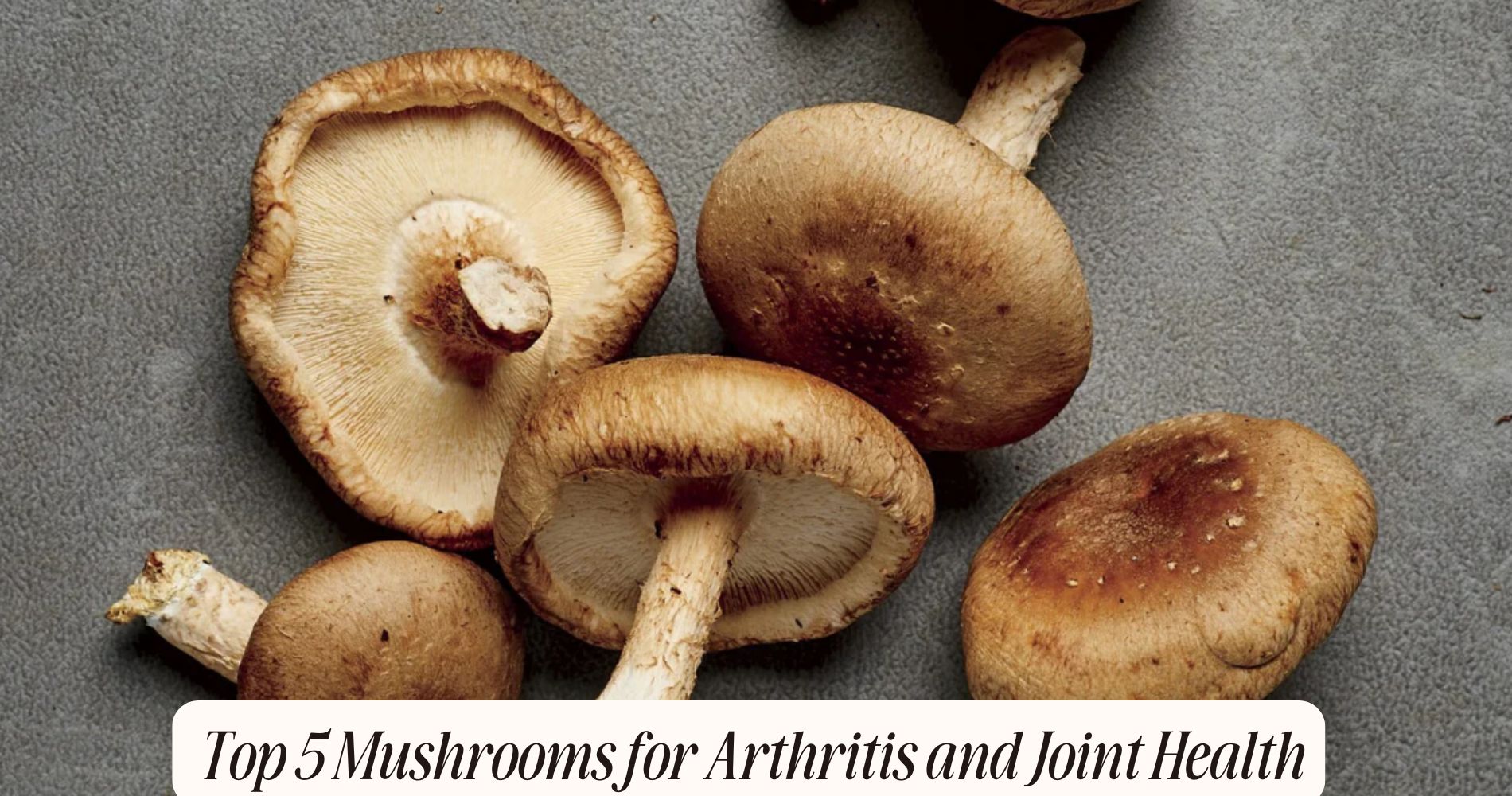
Top 5 Mushrooms for Arthritis and Joint Health
Reishi
Reishi mushrooms, known for their potent anti-inflammatory properties, may help alleviate arthritis symptoms. These mushrooms contain bioactive compounds like triterpenoids and polysaccharides, which have been shown to reduce inflammation and support immune function. The anti-inflammatory effects of reishi can be particularly beneficial for individuals suffering from arthritis, as inflammation is a key factor in the progression of this condition.
To experience reishi benefits, it's crucial to reflect on the appropriate reishi dosage. Clinical studies suggest that a daily intake of 1.5 to 9 grams of reishi mushroom extract is effective for reducing inflammation and improving joint health. However, it's important to start with a lower dose and gradually increase it to monitor your body's response. Additionally, consulting with a healthcare professional before starting any new supplement regimen is advisable to guarantee safety and efficacy.

Reishi mushrooms offer a natural, evidence-based option for managing arthritis symptoms. By incorporating reishi into your daily routine, you may find relief from joint pain and inflammation, ultimately improving your quality of life. Remember, consistent use and proper dosing are key to revealing the full potential of reishi benefits.
Shiitake
Shiitake mushrooms, rich in polysaccharides and antioxidants, can help reduce inflammation and bolster immune function, making them a valuable addition to an arthritis management plan. These bioactive compounds, including lentinan and eritadenine, have demonstrated anti-inflammatory properties in clinical studies. By inhibiting inflammatory pathways and oxidative stress, shiitake mushrooms can alleviate joint pain and stiffness associated with arthritis.
To incorporate shiitake benefits into your diet, consider various shiitake recipes. These mushrooms are versatile and can be added to soups, stir-fries, and salads. Cooking shiitake mushrooms releases their nutrients, enhancing their bioavailability. For instance, a shiitake and vegetable stir-fry not only provides a rich source of vitamins and minerals but also guarantees you consume the beneficial polysaccharides and antioxidants effectively.

Moreover, shiitake mushrooms support overall immune health, which is essential for individuals with arthritis. By modulating immune responses, they can help your body better manage inflammation and prevent flare-ups. Consistent inclusion of shiitake mushrooms in your diet can contribute to long-term joint health and improved quality of life.
Maitake
Maitake mushrooms, known for their potent anti-inflammatory and immunomodulating properties, can be an effective dietary supplement for managing arthritis symptoms. Studies indicate that maitake mushrooms contain bioactive compounds such as beta-glucans, which can reduce inflammation and bolster immune function. These properties are essential for individuals with arthritis, as chronic inflammation is a hallmark of the condition.

Incorporating maitake mushrooms into your diet may help alleviate joint pain and improve mobility. Additionally, their antioxidant content can protect joint tissues from oxidative stress, further aiding in symptom management. The maitake benefits extend beyond inflammation control; they also support overall immune health, which can be compromised in chronic inflammatory conditions.
To leverage these maitake benefits, consider adding them to your meals. Simple maitake recipes include sautéing them with garlic and olive oil or incorporating them into soups and stews. Their rich, earthy flavor makes them a versatile ingredient in various dishes.
Lion's Mane
Lion's Mane mushrooms, renowned for their neuroprotective and anti-inflammatory properties, can offer significant relief for arthritis sufferers. These mushrooms contain bioactive compounds like hericenones and erinacines, which can reduce inflammation and oxidative stress in your joints. Clinical studies have shown that these compounds help inhibit the production of pro-inflammatory cytokines, thereby alleviating joint pain and swelling associated with arthritis.
Moreover, Lion's Mane isn't just beneficial for joint health; it also provides cognitive benefits. Research indicates that this mushroom can enhance nerve growth factor (NGF) synthesis, which supports the maintenance and regeneration of nerve cells, potentially improving cognitive function. This dual action can be particularly beneficial if you're managing chronic pain, which often affects mental clarity and overall quality of life.

Additionally, Lion's Mane offers robust immune support. The mushroom's polysaccharides and beta-glucans have been shown to boost the body's immune response, helping you fend off infections and maintain overall health. This is essential for arthritis sufferers, as a strong immune system can mitigate the disease's secondary complications.
Including Lion's Mane in your diet could provide an extensive approach to managing arthritis, enhancing both physical and cognitive well-being.
Chaga
Chaga mushrooms, rich in antioxidants and anti-inflammatory compounds, can greatly alleviate arthritis symptoms by reducing oxidative stress and inflammation in the joints.
The primary chaga benefits stem from its high content of polysaccharides, particularly beta-glucans, which modulate the immune response. This modulation helps decrease the chronic inflammation associated with arthritis, providing relief.
Research indicates that chaga also contains ergosterol, a precursor to vitamin D, which is essential for bone health and joint function. The antioxidants in chaga, such as superoxide dismutase (SOD) and melanin, combat free radicals, thereby protecting joint tissues from oxidative damage. This dual action of anti-inflammatory and antioxidant properties makes chaga a potent natural remedy for arthritis.

Determining the correct chaga dosage is important for maximizing its benefits. Typically, a daily dosage of 1,000 to 1,500 milligrams of chaga extract is recommended for arthritis relief.
You can consume it as a supplement, tea, or tincture, ensuring consistent intake for best results. Always consult your healthcare provider before starting any new supplement regimen, especially if you have existing health conditions or are taking medication.
Support Your Joint Health with SUPER MUSHROOM GUMMIES
As you learn about the top mushrooms for arthritis and joint health, consider adding Well Gummies' SUPER MUSHROOM GUMMIES to your wellness routine. This easy-to-use gum chew product is infused with 10 functional mushrooms, designed to naturally fuel your brain and energize your body. Our vegan gummies provide calmer energy, sharper focus, and immune support for a balanced body and clear mind.
Enjoy the delightful taste of fresh wild berries, just as satisfying as your favorite candy, but without the jitters or crash. Shine all day with the natural benefits of SUPER MUSHROOM GUMMIES and support your joint health effortlessly.
Frequently Asked Questions
Are There Any Potential Side Effects From Consuming These Medicinal Mushrooms?
Yes, there are potential side effects from consuming these medicinal mushrooms. You might experience potential allergies or interaction risks with medications. Always consult your healthcare provider before adding medicinal mushrooms to your regimen for safety.
How Should Mushrooms Be Prepared to Maximize Their Health Benefits?
You should use cooking methods like steaming or sautéing and extraction techniques such as hot water or alcohol extraction to maximize mushrooms' health benefits. These methods enhance nutrient absorption and bioavailability, supporting overall joint health.
Can These Mushrooms Be Consumed Together for Enhanced Effects?
Yes, you can consume these mushroom combinations for potentially enhanced effects. Studies suggest synergistic effects may occur, amplifying their anti-inflammatory properties. However, consult your healthcare provider to guarantee the safety and efficacy of combined usage.
Are There Any Specific Dosages Recommended for Arthritis Relief?
For arthritis relief, consult dosage guidelines on mushroom extracts. Typically, doses range from 1 to 3 grams daily. However, individual needs may vary, so it's essential to follow your healthcare provider's recommendations for best results.
How Long Does It Typically Take to Notice Improvements in Joint Health?
You'll typically notice improvements in joint health within 4-8 weeks. The improvement timeline varies due to individual joint health factors like severity of arthritis, overall health, and adherence to treatment protocols.
Conclusion
Incorporating Reishi, Shiitake, Maitake, Lion's Mane, and Chaga mushrooms into your diet can potentially enhance joint health and alleviate arthritis symptoms.
These mushrooms are rich in anti-inflammatory and antioxidant compounds, which may reduce joint pain and improve mobility.
While further clinical research is needed, current evidence suggests that these fungi can be a beneficial supplement to traditional arthritis treatments.
Always consult your healthcare provider before adding new supplements to your regimen.




